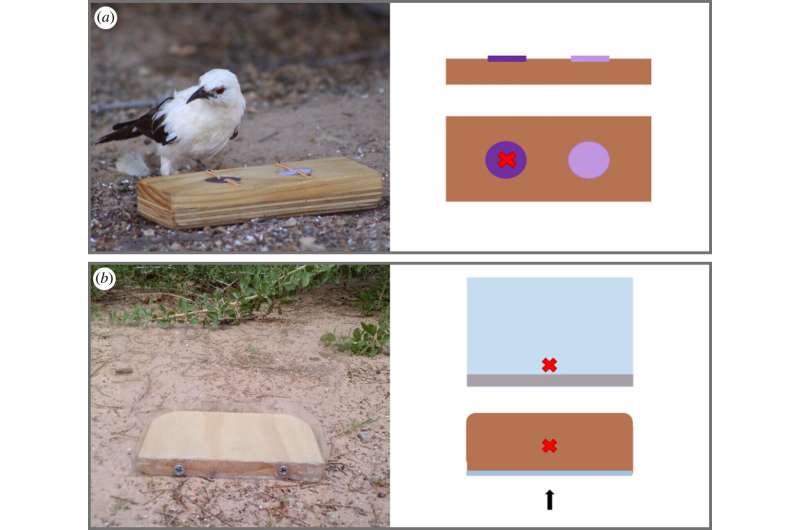(a) Wild pied babbler interacting with the cognitive task used to quantify associative and reversal learning (left); and schematic of the associative and reversal learning task (right) showing both the overhead and front view. (b) Example of task used to quantify inhibitory control (left) and schematic of the inhibitory control task (right), which includes a frontal view and an overhead view with a black arrow indicating the direction of approach. The red X represents the location of the food reward: behind the barrier in the inhibitory control task and in the well of the rewarded color shade (assigned randomly for each test subject) in the associative or reversal learning task. Photo: Nicholas Pattinson. Credit: Proceedings of the Royal Society B: Biological Sciences (2022). DOI: 10.1098/rspb.2022.1748
A team of researchers at the University of Western Australia, working with a colleague from the University of Exeter, has found that as female southern pied babblers grow older, they produce more offspring—even as they lose some of their cognitive abilities. In their study, published in the journal Proceedings of the Royal Society B, the group tested the cognitive abilities of the birds as they aged in the wild while also noting their reproduction levels.
Southern pied babblers are small, black-and-white birds that live in dry savannah regions in Africa. In this new effort, the researchers were interested in learning more about their cognitive abilities as they age. To that end, they captured, studied and released multiple generations of the birds over time to determine their cognitive levels. They also counted the number of chicks produced by each of the females included in the study.
The researchers found that the birds' cognitive levels peaked early and then began to decline in females as they matured. But they also found that as their cognitive abilities declined, the birds produced more and more chicks.
The researchers suggest their findings indicate a tradeoff. Cognitive abilities require a lot of energy. For the birds to survive, they need to conserve energy, and one way to do that is by reducing the energy requirements of the brain. This increases the amount of energy that can be used for producing eggs and rearing chicks. The researchers also note that females of the species compete with other females for breeding rights, which also uses up a lot of energy but does not take much brain power.
Conversely, the researchers found no changes in male cognitive abilities as they grew older. They also found no evidence that birds living in larger groups tended to do better on cognitive tests than those living in smaller groups, a claim made by some prior research teams. The researchers also found that females who had less cognitive decline than the others tended to produce fewer chicks.
More information: Camilla Soravia et al, General cognitive performance declines with female age and is negatively related to fledging success in a wild bird, Proceedings of the Royal Society B: Biological Sciences (2022). DOI: 10.1098/rspb.2022.1748
Journal information: Proceedings of the Royal Society B
© 2022 Science X Network























